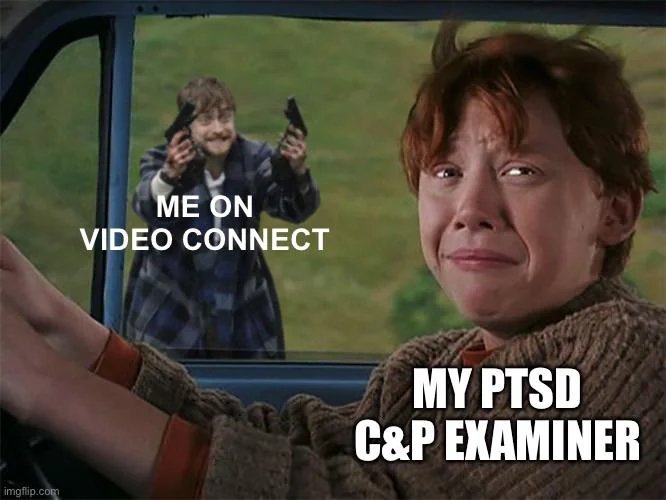VA Special Monthly Compensation (SMC) for Mental Health Conditions
101st Airborne soldiers raising American flag on Ranger Hill - Operation Cook 1967
When reading the regulations that govern Special Monthly Compensation (SMC), it would be easy to think that the only way to qualify for SMC is if you have severe physical impairments. There really isn’t much overt language that mentions qualifying due to a service-connected mental health condition like PTSD, major depressive disorder, or anxiety, but it definitely is possible.
If you look at the symptoms listed on the mental health or PTSD VA Disability Benefits Questionnaires (DBQ) which the VA uses to rate mental health conditions you’ll notice some severe symptoms listed:
Suicidal ideation
Obsessional rituals which interfere with routine activities
Impaired impulse control, such as unprovoked irritability with periods of violence
Spatial disorientation
Persistent delusions or hallucinations
Grossly inappropriate behavior
Persistent danger of hurting self or others
Neglect of personal appearance and hygiene
Intermittent inability to perform activities of daily living, including maintenance of minimal personal hygiene
Disorientation to time or place
38 CFR 3.352 includes the criteria for determining need for aid and attendance (A&A) which is paid under the SMC-L rate:
“The following will be accorded consideration in determining the need for regular aid and attendance (§ 3.351(c)(3): inability of claimant to dress or undress himself (herself), or to keep himself (herself) ordinarily clean and presentable; frequent need of adjustment of any special prosthetic or orthopedic appliances which by reason of the particular disability cannot be done without aid (this will not include the adjustment of appliances which normal persons would be unable to adjust without aid, such as supports, belts, lacing at the back, etc.); inability of claimant to feed himself (herself) through loss of coordination of upper extremities or through extreme weakness; inability to attend to the wants of nature; or incapacity, physical or mental, which requires care or assistance on a regular basis to protect the claimant from hazards or dangers incident to his or her daily environment.”
If you look back at that symptom list above from the DBQ after reading 38 CFR 3.352, you’ll notice that many of those symptoms could be a very strong basis to prove a need for aid and attendance. Some of them are almost a verbatim basis for it. Most of those symptoms listed above are part of the VA’s criteria for a 100% mental health rating.
Another activity of daily living not listed on there that is often an issue for Veteran’s with severe mental health conditions is medication management. If a Veteran needs assistance with managing or remembering to take their medications, that can also be a good basis to show a need for aid and attendance.
101st Airborne gunners firing 105 mm howitzer near Tam Ky - Operation Wheeler 1967
One thing to be careful of when applying for aid and attendance for a mental health condition are proposals of incompetency. If the evidence indicates that a Veteran is not competent to manage their own financial affairs, the VA may make such a proposal and move to appoint a fiduciary.
38 CFR § 3.353 includes the definition of mental incompetency: “A mentally incompetent person is one who because of injury or disease lacks the mental capacity to contract or to manage his or her own affairs, including disbursement of funds without limitation.”
Such proposals, when made incorrectly, can be troublesome, but there are ways to fight them.
Special Monthly Compensation is an ancillary benefit that the VA is supposed to automatically consider when the evidence indicates a Veteran might be eligible. Every Veteran who is rated at 100% for mental health should at least be considered for aid and attendance (SMC-L), but that does not seem to be the common practice of the VA. SMC-L pays roughly $1k per month more than a 100% rating for a Veteran and spouse, which would make a big difference in a lot of Veteran’s lives.
With all that in mind, I should note that not every Veteran who is rated at 100% for mental health will be eligible for SMC-L for aid and attendance. It’s dependent on the severity of your symptoms and the factual need for regular aid and attendance. That need for help doesn’t have to be constant, but it does need to be regular. A Veteran may qualify for SMC even if they don’t require assistance with all activities of daily living.
Special Monthly Compensation claims and appeals are complex, and the VA makes a lot of errors on them. Make sure you seek guidance from a VA accredited advocate who’s well-versed in SMC before you begin your pursuit of SMC benefits.
American Veteran Advocacy helps Veterans with VA disability compensation claims and appeals, and specializes in special monthly compensation (SMC). If you are a Veteran and need help with your claim or appeal, you can contact me here.




